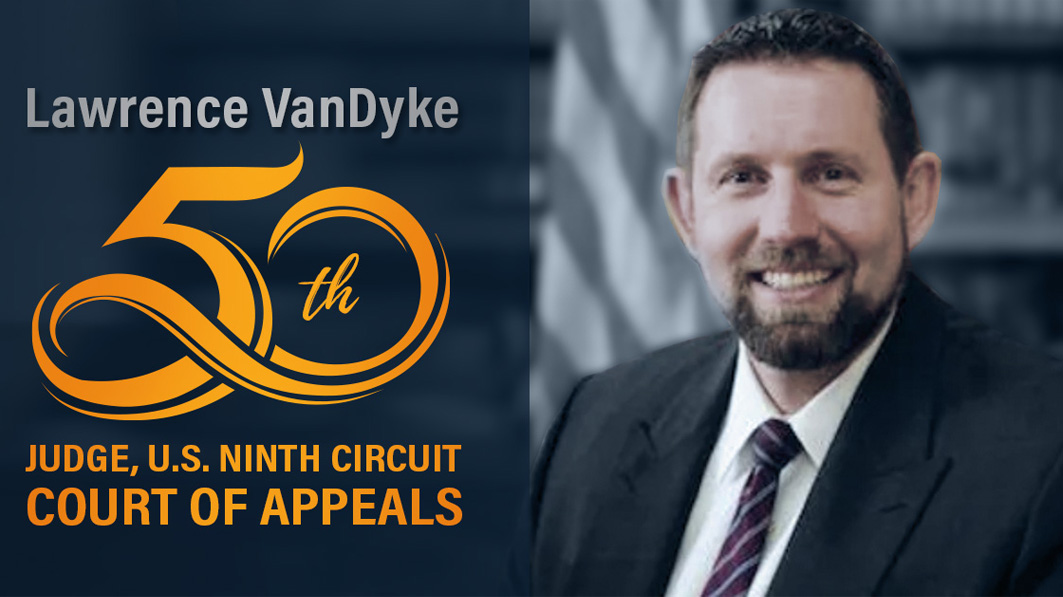On Wednesday, the United States Senate confirmed Judge Lawrence VanDyke to the U.S. Court of Appeals for the Ninth Circuit. This marks a stunning milestone for the Trump Administration, with President Trump now having appointed 50 judges to the U.S. Circuit Courts of Appeal.
First Liberty Institute, one of the nation’s premier law firms dedicated to defending religious liberty, posted a tweet touting Judge VanDyke’s confirmation. “50th confirmation! Lawrence VanDyke is confirmed to the U.S. Court of Appeals for the Ninth Circuit. Fun fact: his first oral argument was as a volunteer attorney for First Liberty.”
Carrie Severino, a former law clerk to Supreme Court Justice Clarence Thomas and current chief counsel to the Judicial Crisis Network also praised the news via tweet. “Fifty circuit court judges! The President and his Senate allies have answered the call of the American people, who have made it clear through the democratic process that they want judges who adhere to the Constitution and don’t impose an agenda from the bench. That is exactly what they are getting.”
Fox News compared President Trump’s 50 circuit court nominees in three years with President Obama’s judicial legacy. “By contrast, President Barack Obama nominated a total of 55 circuit judges who were confirmed over eight years — and Obama’s nominees were, on average, approximately ten years older. The White House has dramatically transformed the Ninth Circuit, a powerful court with jurisdiction over nine states and Guam that has long been a thorn in the president’s side.”
Now that the Senate has confirmed practically all of President Trump’s nominees for the circuit courts, Senate Majority Leader Mitch McConnell said that the Senate would now begin working on confirming judges to the U.S. District Courts. “‘Whatever’s on the calendar, I’m going to make every effort I can to clear them all,’ McConnell said in an interview. ‘We’ve already… finished up the circuits. So I’m going to make my best effort to clear the calendar of district judges by the end of the year,’” an article in Politico quoted McConnell as saying.
These days, the enormous power of a single federal judge seems to be unanimously recognized by both those on the left and the right.
In a speech to The Heritage Foundation, Assistant Attorney General Beth Williams focused in on the problem of nationwide injunctions. These injunctions place a nationwide halt on an executive branch policy. During President Obama’s administration, the federal judiciary issued an average of 2.5 nationwide injunctions per year. Yet during President Trump’s first year in office, the federal judiciary issued 20 such injunctions against the administration.
Judges didn’t always have this much power. Indeed, the first nationwide injunction wasn’t issued until the 1960s.
The Federalist Papers highlight the limited power of the judiciary. The papers are a compilation of 85 essays written by Alexander Hamilton, James Madison and John Jay under the pseudonym “Publius,” that were composed to support the ratification of the constitution.
In Federalist No. 78, Alexander Hamilton wrote, “The judiciary, on the contrary, has no influence over either the sword or the purse; no direction either of the strength or of the wealth of the society; and can take no active resolution whatever. It may truly be said to have neither FORCE nor WILL, but merely judgment.” “This proves incontestably, that the judiciary is beyond comparison the weakest of the three departments of power,” Hamilton argued.
Far from being the weakest branch, it seems that the judicial branch now may be the most powerful. Even though policy issues are meant to be decided by the legislative branch, unelected judges have decided numerous policy issues over the years. Some of these include the Supreme Court’s legalization of abortion nationwide and its mandated recognition of same-sex marriage across the nation.
The difference between how the framers of the constitution viewed the judiciary, and how we see the role and power of the judiciary today is the difference between night and day.
This is why President Trump’s appointment of 50 constitutionalist judges to the courts of appeals is so important. 28% of judgeships on the courts of appeals have now been filled by President Trump. This is a remarkable feat to pull off in three years.
We need judges who will interpret the laws made by Congress, not write laws themselves. Thankfully, we now have 50 more such judges.
Photo from First Liberty






